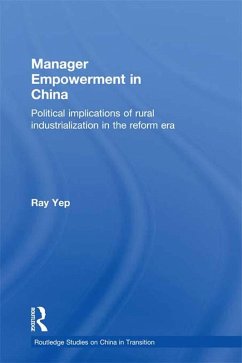Ray Yep
Manager Empowerment in China (eBook, PDF)
Political Implications of Rural Industrialisation in the Reform Era
42,95 €
42,95 €
inkl. MwSt.
Sofort per Download lieferbar

21 °P sammeln
42,95 €
Als Download kaufen

42,95 €
inkl. MwSt.
Sofort per Download lieferbar

21 °P sammeln
Jetzt verschenken
Alle Infos zum eBook verschenken
42,95 €
inkl. MwSt.
Sofort per Download lieferbar
Alle Infos zum eBook verschenken

21 °P sammeln
Ray Yep
Manager Empowerment in China (eBook, PDF)
Political Implications of Rural Industrialisation in the Reform Era
- Format: PDF
- Merkliste
- Auf die Merkliste
- Bewerten Bewerten
- Teilen
- Produkt teilen
- Produkterinnerung
- Produkterinnerung

Bitte loggen Sie sich zunächst in Ihr Kundenkonto ein oder registrieren Sie sich bei
bücher.de, um das eBook-Abo tolino select nutzen zu können.
Hier können Sie sich einloggen
Hier können Sie sich einloggen
Sie sind bereits eingeloggt. Klicken Sie auf 2. tolino select Abo, um fortzufahren.

Bitte loggen Sie sich zunächst in Ihr Kundenkonto ein oder registrieren Sie sich bei bücher.de, um das eBook-Abo tolino select nutzen zu können.
Manager Empowerment in China provides an analysis of the new state-society relationship in China and demonstrates the complexity and fluidity involved in institutional development and market transformation.
- Geräte: PC
- mit Kopierschutz
- eBook Hilfe
- Größe: 0.93MB
Andere Kunden interessierten sich auch für
![Manager Empowerment in China (eBook, ePUB) Manager Empowerment in China (eBook, ePUB)]() Ray YepManager Empowerment in China (eBook, ePUB)42,95 €
Ray YepManager Empowerment in China (eBook, ePUB)42,95 €![The Japanese Industrial Economy (eBook, PDF) The Japanese Industrial Economy (eBook, PDF)]() Ian InksterThe Japanese Industrial Economy (eBook, PDF)42,95 €
Ian InksterThe Japanese Industrial Economy (eBook, PDF)42,95 €![Chinese Citizenship (eBook, PDF) Chinese Citizenship (eBook, PDF)]() Chinese Citizenship (eBook, PDF)46,95 €
Chinese Citizenship (eBook, PDF)46,95 €![Non-Governmental Organizations in Contemporary China (eBook, PDF) Non-Governmental Organizations in Contemporary China (eBook, PDF)]() Qiusha MaNon-Governmental Organizations in Contemporary China (eBook, PDF)46,95 €
Qiusha MaNon-Governmental Organizations in Contemporary China (eBook, PDF)46,95 €![The Political Economy of Reproduction in Japan (eBook, PDF) The Political Economy of Reproduction in Japan (eBook, PDF)]() Takeda HirokoThe Political Economy of Reproduction in Japan (eBook, PDF)56,95 €
Takeda HirokoThe Political Economy of Reproduction in Japan (eBook, PDF)56,95 €![North Africa (eBook, PDF) North Africa (eBook, PDF)]() North Africa (eBook, PDF)50,95 €
North Africa (eBook, PDF)50,95 €![State, Society and the Environment in South Asia (eBook, PDF) State, Society and the Environment in South Asia (eBook, PDF)]() Stig Toft MadsenState, Society and the Environment in South Asia (eBook, PDF)30,95 €
Stig Toft MadsenState, Society and the Environment in South Asia (eBook, PDF)30,95 €-
-
-
Manager Empowerment in China provides an analysis of the new state-society relationship in China and demonstrates the complexity and fluidity involved in institutional development and market transformation.
Dieser Download kann aus rechtlichen Gründen nur mit Rechnungsadresse in A, B, BG, CY, CZ, D, DK, EW, E, FIN, F, GR, HR, H, IRL, I, LT, L, LR, M, NL, PL, P, R, S, SLO, SK ausgeliefert werden.
Produktdetails
- Produktdetails
- Verlag: Taylor & Francis
- Seitenzahl: 272
- Erscheinungstermin: 8. Dezember 2003
- Englisch
- ISBN-13: 9781134457076
- Artikelnr.: 40464713
- Verlag: Taylor & Francis
- Seitenzahl: 272
- Erscheinungstermin: 8. Dezember 2003
- Englisch
- ISBN-13: 9781134457076
- Artikelnr.: 40464713
- Herstellerkennzeichnung Die Herstellerinformationen sind derzeit nicht verfügbar.
Dr. Ray Yep is Assistant Professor in the Department of Public and Social Administration at City University Hong Kong.
Part 1 1. Introduction 2. Implications of Understanding Rural
Transformation 3. Defining Key Terms 4. Chinese State Meets Social
Scientists 5. Research Focus: State-Manager Relations In Rural China 6.
Leaping Forward TVE Development in the 1990s 7. The Analytical Strategy 8.
Contextualizing Zibo 8. Key Arguments 9. Structure of the Book Part 2 10.
Continuities and Discontinuities of Rural Transformation 11. Changes in
Institutional Setting 12. New Challenges for Rural Governance 13.
Development of Rural Enterprises as a Response to Challenges 14.
Institutional Legacies of Mao's Economy 15. Zibo on the Eve of Reform Part
3 16. The Rise of Enterprise Managers in Rural China 17. TVE Managers:
Entrepreneurs Without Ownership 18. The Importance of Human Capital 19. TVE
Managers on the Road to Political Power 20. Summary Part 4 21. Where Local
Government Still Matters for Business Transaction 22. The Parochialism of
TVE Development 23. General Infrastructureal Support of Local Government
24. Securing Capital Supply 25. Business Networking 26. A Different
Universe for Key Enterprises 27. Summary Part 5 28. Accommodating Managers'
Autonomy in Enterprise Operation 29. Motivating the Involvement of Local
Government 30. Benchmarking Enterprise Performance 31. Allocating
Enterprise Resources 32. Control of Staffing Decision 33. Summary Part 6
34. Evaluating Enterprise Reform: A Local Perspective 35. A Brief Review of
Enterprise Reforms in Post-Mao China 36. Indecisiveness of the Central
Government 37. Relevance for the Rural Economy 38. Calculations of the
Enterprise Managers Part 7 39. Managers Chasing In: Shareholding Reform in
Rural China 40. Shareholding Cooperative System: Background and Development
41. Dividing the Cake: A Balancing Act 42. Reform Intensification the
Mid-1990s 43. Summary Part 8 43. Conclusion 44. History Matters 45. Towards
a Synergistic Perspective 46. Vulnerability of Local Collaboration 47.
Concluding Remarks
Transformation 3. Defining Key Terms 4. Chinese State Meets Social
Scientists 5. Research Focus: State-Manager Relations In Rural China 6.
Leaping Forward TVE Development in the 1990s 7. The Analytical Strategy 8.
Contextualizing Zibo 8. Key Arguments 9. Structure of the Book Part 2 10.
Continuities and Discontinuities of Rural Transformation 11. Changes in
Institutional Setting 12. New Challenges for Rural Governance 13.
Development of Rural Enterprises as a Response to Challenges 14.
Institutional Legacies of Mao's Economy 15. Zibo on the Eve of Reform Part
3 16. The Rise of Enterprise Managers in Rural China 17. TVE Managers:
Entrepreneurs Without Ownership 18. The Importance of Human Capital 19. TVE
Managers on the Road to Political Power 20. Summary Part 4 21. Where Local
Government Still Matters for Business Transaction 22. The Parochialism of
TVE Development 23. General Infrastructureal Support of Local Government
24. Securing Capital Supply 25. Business Networking 26. A Different
Universe for Key Enterprises 27. Summary Part 5 28. Accommodating Managers'
Autonomy in Enterprise Operation 29. Motivating the Involvement of Local
Government 30. Benchmarking Enterprise Performance 31. Allocating
Enterprise Resources 32. Control of Staffing Decision 33. Summary Part 6
34. Evaluating Enterprise Reform: A Local Perspective 35. A Brief Review of
Enterprise Reforms in Post-Mao China 36. Indecisiveness of the Central
Government 37. Relevance for the Rural Economy 38. Calculations of the
Enterprise Managers Part 7 39. Managers Chasing In: Shareholding Reform in
Rural China 40. Shareholding Cooperative System: Background and Development
41. Dividing the Cake: A Balancing Act 42. Reform Intensification the
Mid-1990s 43. Summary Part 8 43. Conclusion 44. History Matters 45. Towards
a Synergistic Perspective 46. Vulnerability of Local Collaboration 47.
Concluding Remarks
Part 1 1. Introduction 2. Implications of Understanding Rural
Transformation 3. Defining Key Terms 4. Chinese State Meets Social
Scientists 5. Research Focus: State-Manager Relations In Rural China 6.
Leaping Forward TVE Development in the 1990s 7. The Analytical Strategy 8.
Contextualizing Zibo 8. Key Arguments 9. Structure of the Book Part 2 10.
Continuities and Discontinuities of Rural Transformation 11. Changes in
Institutional Setting 12. New Challenges for Rural Governance 13.
Development of Rural Enterprises as a Response to Challenges 14.
Institutional Legacies of Mao's Economy 15. Zibo on the Eve of Reform Part
3 16. The Rise of Enterprise Managers in Rural China 17. TVE Managers:
Entrepreneurs Without Ownership 18. The Importance of Human Capital 19. TVE
Managers on the Road to Political Power 20. Summary Part 4 21. Where Local
Government Still Matters for Business Transaction 22. The Parochialism of
TVE Development 23. General Infrastructureal Support of Local Government
24. Securing Capital Supply 25. Business Networking 26. A Different
Universe for Key Enterprises 27. Summary Part 5 28. Accommodating Managers'
Autonomy in Enterprise Operation 29. Motivating the Involvement of Local
Government 30. Benchmarking Enterprise Performance 31. Allocating
Enterprise Resources 32. Control of Staffing Decision 33. Summary Part 6
34. Evaluating Enterprise Reform: A Local Perspective 35. A Brief Review of
Enterprise Reforms in Post-Mao China 36. Indecisiveness of the Central
Government 37. Relevance for the Rural Economy 38. Calculations of the
Enterprise Managers Part 7 39. Managers Chasing In: Shareholding Reform in
Rural China 40. Shareholding Cooperative System: Background and Development
41. Dividing the Cake: A Balancing Act 42. Reform Intensification the
Mid-1990s 43. Summary Part 8 43. Conclusion 44. History Matters 45. Towards
a Synergistic Perspective 46. Vulnerability of Local Collaboration 47.
Concluding Remarks
Transformation 3. Defining Key Terms 4. Chinese State Meets Social
Scientists 5. Research Focus: State-Manager Relations In Rural China 6.
Leaping Forward TVE Development in the 1990s 7. The Analytical Strategy 8.
Contextualizing Zibo 8. Key Arguments 9. Structure of the Book Part 2 10.
Continuities and Discontinuities of Rural Transformation 11. Changes in
Institutional Setting 12. New Challenges for Rural Governance 13.
Development of Rural Enterprises as a Response to Challenges 14.
Institutional Legacies of Mao's Economy 15. Zibo on the Eve of Reform Part
3 16. The Rise of Enterprise Managers in Rural China 17. TVE Managers:
Entrepreneurs Without Ownership 18. The Importance of Human Capital 19. TVE
Managers on the Road to Political Power 20. Summary Part 4 21. Where Local
Government Still Matters for Business Transaction 22. The Parochialism of
TVE Development 23. General Infrastructureal Support of Local Government
24. Securing Capital Supply 25. Business Networking 26. A Different
Universe for Key Enterprises 27. Summary Part 5 28. Accommodating Managers'
Autonomy in Enterprise Operation 29. Motivating the Involvement of Local
Government 30. Benchmarking Enterprise Performance 31. Allocating
Enterprise Resources 32. Control of Staffing Decision 33. Summary Part 6
34. Evaluating Enterprise Reform: A Local Perspective 35. A Brief Review of
Enterprise Reforms in Post-Mao China 36. Indecisiveness of the Central
Government 37. Relevance for the Rural Economy 38. Calculations of the
Enterprise Managers Part 7 39. Managers Chasing In: Shareholding Reform in
Rural China 40. Shareholding Cooperative System: Background and Development
41. Dividing the Cake: A Balancing Act 42. Reform Intensification the
Mid-1990s 43. Summary Part 8 43. Conclusion 44. History Matters 45. Towards
a Synergistic Perspective 46. Vulnerability of Local Collaboration 47.
Concluding Remarks







